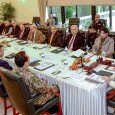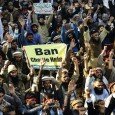By Arif Rafiq –
Having avoided forming a cohesive anti-terror strategy initially, the Prime Minister is now on the backfoot
For a few weeks, it appeared as if Prime Minister Nawaz Sharif had all but disappeared. As Quaid-e Azam’s residency in Ziarat burned to the ground and terrorists struck virtually every major city in Pakistan, Mian Sahab was nowhere to be seen.
That is not to say he was twiddling his thumbs as the fires consumed Rome. No, both Nawaz and his team have been quite energetic in pushing forward new power projects, and dealing with the structural challenges that are suffocating Pakistan’s economy. Low-hanging fruit, such as the circular debt problem, have been dealt with – at least for now. Gaddani could be home to up to ten coal-fired power plants and a large oil refinery. Punjab appears to be moving forward with gas imports from India, as well as alternative energy projects. And the World Bank has reportedly offered to fund the Diamer-Bhasha dam.
Right off the bat, the Pakistan Muslim League-Nawaz (PML-N) has been aggressively pursuing as many energy projects as possible. But it has fallen short when it comes to combatting Pakistan’s other forces of darkness. The country is in a state of war. Up to now, Nawaz has been ambivalent in accepting his role as de-facto commander-in-chief of the armed forces (the de jure authority belongs to the president). He has been more comfortable playing the role of CEO, presenting quarterly reports of the country’s finances. But he leads a republic, not a limited liability corporation. And as prime minister, he is not just in charge of reviving Pakistan’s dormant economy – he must also lead the country in a war he once had the ability to avoid; a war he and his party could criticise without being responsible for the lives of one hundred and ninety million people; and a war from which his brother, Shahbaz, had asked the Tehreek-e Taliban Pakistan (TTP) in 2010 to “spare Punjab.”
In August, during his maiden address to the nation – which should have been given during the very week he assumed office – Nawaz explained the origins of the energy crisis in detail and offered realistic promises of the timeframe in which it could be resolved. There were no Raja Rental-esque pledges of quick fixes. But when it came to national security, Nawaz was of two minds: the terrorists – who, of course, went unnamed – were both an “existential threat” and a force that could be negotiated with.
Thus far, the PML-N’s approach to counterterrorism and national security has been confused, slow, and awkward. After an alarming upsurge of terror over Eid-ul-Fitr, Interior Minister Chaudhry Nisar Ali Khan held a press conference in which he was overly defensive about his party’s sluggishness in introducing a counterterrorism strategy. Chaudhry Nisar mistakenly referred to the counterterrorism strategy his ministry was developing as a “national security strategy.” But a counterterrorism strategy is only a small component of national security, which should deal with broader economic and foreign policy issues too. Nisar’s confusion points toward the fact that when it comes to civilian bodies, the Interior Ministry has so far been playing an outsized role on national security.
Chaudhry Nisar was also overly defensive over media criticism, claiming that the government was doing its “homework” on counterterrorism. But as the PML-N government plays catch-up, it faces actual tests on a daily basis, with terrorist attacks that are taking place as far north as Gilgit-Baltistan and all the way down south in Karachi. The homework should have been done before the PML-N came to power – during the one-month, post-election transition period and the five years in which the PML-N ran Punjab and led the federal opposition.
The PML-N is on the back foot when it comes to counterterrorism because it failed to take the issue seriously, preferring play to its conservative, anti-war base. Conveniently, it opposed military operations in North Waziristan, and never offered a constructive alternative to the Pakistan Peoples Party-led government’s counterterrorism policies. Now, the PML-N is performing an indelicate U-turn on terror. Chaudhry Nisar, echoing General Ashfaq Parvez Kayani, said that the war against terrorists who kill Pakistanis in the streets is “our war.”
The PML-N’s embrace of the anti-terror fight will make it a target of the Pakistan Tehreek-e Insaf (PTI), which will now have a greater opportunity to knock Nawaz & Co. on the head with its anti-war agenda. And the PML-N could for the first time become a full-fledged target of the TTP, which, in a letter released in August, acknowledged that it had been sparing the party from its wrath. If and when the TTP sets its crosshairs on the PML-N and hunts its officials, the party could face a pushback from within, including its rank-and-file, who are more inclined to wish the war away. No PML-N figure could be more effective than Nawaz in maintaining party cohesiveness if the TTP begins to target it, causing strain within.
Nawaz Sharif must play a more proactive role in shaping national security policy – both behind the scenes and publicly. So far, he has pursued a puzzling course when it comes to distributing and exercising national security responsibilities. Nawaz has yet to appoint an ambassador to the United States, with whom we share our most important bilateral relationship. He has retained defense and foreign ministry portfolios for himself, while the division of labour between Sartaj Aziz and Tariq Fatemi, his two chief foreign policy and national security advisors, remains ambiguous. Aziz effectively plays the role of foreign minister, but either he or Fatemi should have been appointed as national security advisor.
Strangely, Nawaz – perhaps Pakistan’s strongest advocate for civilian control over the military – has relied on private meetings with General Kayani, sometimes with Shahbaz in attendance, to develop a civil-military consensus on foreign and national security policy. While private meetings between the prime minister and army chief may be useful in building trust between the two individuals, they are no replacement for institutional methods for building national security policy: civilian-led bodies that demonstrate the prime minister’s supremacy and incorporate Pakistan’s economic, energy, and human security interests, as much as they do its more traditional strategic concerns.
Since 1999, the PML-N has strongly advocated the use of the Defence Committee of the Cabinet (DCC) as a civilian-led body to build national security policy through an institutional framework – a contrast to the troika meetings that had produced policies that would invariably be shaped more by the military than by civilians. In 1999, weeks before the Musharraf coup, Sartaj Aziz – currently Nawaz’s advisor on foreign affairs and national security – produced a proposal for strengthening the DCC, making it into a more robust organisation with a permanent secretariat, led by a national security advisor (NSA). One might have expected the PML-N to come back into power ready to implement a DCC reform plan immediately. But it took Nawaz ten weeks to take the simple step of convening the DCC, despite the dozens of terror attacks and escalation of tensions with India in Kashmir.
After the first DCC meeting, the government announced that it would reconstitute the body as the Cabinet Committee on National Security (CCNS) – a positive but belated step that has delayed the much needed steps of appointing an NSA, building a secretariat to perform analysis, and developing a comprehensive national security strategy. Without an overall strategy that defines Pakistan’s objectives in the region and how it will secure them, the Nawaz government is rendered a reactive force, unable to push forward effective counterterrorism or transformative policies toward Afghanistan and India. It is left vulnerable to the compulsions of crisis – whether it’s along the Line of Control, in Kabul, or Quetta – with a weakened ability to perform contingency planning that would allow it, for example, to assess the economic impact on Pakistan of a civil war in Afghanistan.
With the CCNS now established, Nawaz must make up for lost time. He must force the body to play an agenda-setting role. Since coming to power, Nawaz has sought to organise an all-parties conference (APC) to build a consensus counterterrorism policy. It is a completely misguided approach that reflects Nawaz’s reluctance to take full responsibility for the tough decision of continuing the fight against the TTP. And it has given Imran Khan, who refused to take part in the meeting, an opportunity to score political points. The net results are a delay in the forming of a counterterrorism policy, not to mention Nawaz appearing feckless. While an APC is unnecessary, dialogue and debate can take place in parliament, especially in national security-related committees. PTI now has a substantial presence in the National Assembly, and so there is no need for an APC to give it a platform to express itself.
Ultimately, it is Nawaz Sharif – the elected prime minister of Pakistan – who must make the critical decisions. Responsibility cannot be devolved to an ad-hoc body. Nawaz must own the war against the TTP and frame it in the context of building a safer, more prosperous and just Pakistan. As chief executive, Nawaz must convince Pakistan’s citizenry of the hard but necessary costs of combatting militants and the reality that for many violent forces, peace talks will not be an option, and the TTP cannot simply be wished away.
After years of avoiding the terror issue, and without an overall vision of Pakistan and the region to present to his people, Nawaz will likely find it difficult to rally public support for a sustained fight against the TTP. Indeed, the public would probably meet his sudden reversal with cynicism. And Nawaz will likely be uncomfortable with publicly recognising the ideological nature of the TTP’s agenda: that it is not simply reacting to the army’s operations in the Federally Administered Tribal Areas or support for the US in Afghanistan, but wants to take over the country and impose a brand of Islam that is at odds with that practiced by most Pakistanis. Yet he is also the Nawaz Sharif who stood as one of the first Pakistani politicians to admit that Ajmal Kasab was a Pakistani national. He has also boldly called for a policy of non-interference in Afghanistan. And he is someone who has rightly focused on prioritising cooperation with India that furthers the prosperity of both countries. There is an ample reservoir of courage in the man often described by his detractors as timid.
Perhaps it is Nawaz’s simple pragmatism that allows him to recast the anti-terror fight in terms amenable to his conservative, middle class base in urban Punjab. If Pakistan, as Nawaz said in August, cannot go on fighting the world, then it is he who must build and sell a vision for a prosperous Pakistan that is at peace with itself and with its neighbours.
The writer is an adjunct scholar at the Middle East Institute in Washington, DC and president of Vizier Consulting, LLC, which provides strategic guidance on Middle East and South Asian political issues. He tweets at @arifcrafiq






























































































